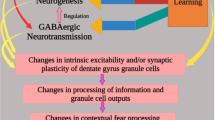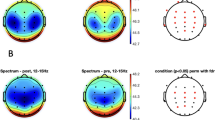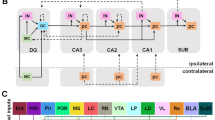Abstract
Theta and gamma oscillations are believed to play an important role in cognition and memory, and their phase coupling facilitates the information transmission in hippocampal-cortex network. In a rat model of chronic stress, the phase coupling of both theta and gamma oscillations between ventral hippocampal CA1 (vCA1) and medial prefrontal cortex (mPFC) was found to be disrupted, which was associated with the impaired synaptic plasticity in the pathway. However, little was known about the mechanisms underlying the process. In order to address this issue, both dopamine and serotonin as monoaminergic neurotransmitters were involved in this study, since they were crucial factors in pathological basis of depressive disorder. Local field potentials (LFPs) were recorded simultaneously at both vCA1 and mPFC regions under anesthesia, before and after the injection of dopamine D1 receptor antagonist and 5-HT1A receptor agonist, respectively. The results showed that the blockage of D1 receptor could lead to depression-like decrement on theta phase coupling. In addition, the activation of 5-HT1A receptor enhanced vCA1–mPFC coupling on gamma oscillations, and attenuated CA1 theta-fast gamma cross frequency coupling. These data suggest that the theta phase coupling between vCA1 and mPFC may be modulated by dopamine system that is an underlying mechanism of the cognitive dysfunction in depression. Besides, the serotonergic system is probably involved in the regulation of gamma oscillations coupling in vCA1–mPFC network.
Graphical Abstract










Similar content being viewed by others
Abbreviations
- CFC:
-
Cross frequency coupling
- CMI:
-
Conditional mutual information
- CUS:
-
Chronic unpredictable stresses
- DA:
-
Dopamine
- fEPSP:
-
Field excitatory postsynaptic potential
- EMA:
-
Evolution map approach
- LFP:
-
Local field potential
- LTP:
-
Long term potentiation
- mPFC:
-
Medial prefrontal cortex
- PAC:
-
Phase-amplitude coupling
- PAC_PLV:
-
Phase-amplitude coupling-phase locking value
- PLV:
-
Phase locking value
- vCA1:
-
Ventral hippocampal CA1
- 5-HT:
-
Serotonin
References
Adhikari A, Topiwala MA, Gordon JA (2010) Synchronized activity between the ventral hippocampus and the medial prefrontal cortex during anxiety. Neuron 65:257–269
Arnsten AF (2011) Prefrontal cortical network connections: key site of vulnerability in stress and schizophrenia. Int J Dev Neurosci 29:215–223
Bartos M, Vida I, Jonas P (2007) Synaptic mechanisms of synchronized gamma oscillations in inhibitory interneuron networks. Nat Rev Neurosci 8:45–56
Benchenane K, Peyrache A, Khamassi M, Tierney PL, Gioanni Y, Battaglia FP, Wiener SI (2010) Coherent theta oscillations and reorganization of spike timing in the hippocampal–prefrontal network upon learning. Neuron 66:921–936
Benchenane K, Tiesinga PH, Battaglia FP (2011) Oscillations in the prefrontal cortex: a gateway to memory and attention. Curr Opin Neurobiol 21:475–485
Bentivoglio M, Morelli M (2005) Chapter I The organization and circuits of mesencephalic dopaminergic neurons and the distribution of dopamine receptors in the brain. Handb Chem Neuroanat 21:1–107
Bieri KW, Bobbitt KN, Colgin LL (2014) Slow and fast gamma rhythms coordinate different spatial coding modes in hippocampal place cells. Neuron 82:670–681
Blier P, Serrano A, Scatton B (1990) Differential responsiveness of the rat dorsal and median raphe 5-HT systems to 5-HT1 receptor agonists and p-chloroamphetamine. Synapse 5:120–133
Bruns A, Eckhorn R (2004) Task-related coupling from high- to low-frequency signals among visual cortical areas in human subdural recordings. Int J Psychophysiol 51:97–116
Buzsaki G (2002) Theta oscillations in the hippocampus. Neuron 33:325–340
Callier S, Snapyan M, Le Crom S, Prou D, Vincent JD, Vernier P (2003) Evolution and cell biology of dopamine receptors in vertebrates. Biol Cell 95:489–502
Canolty RT, Edwards E, Dalal SS, Soltani M, Nagarajan SS, Kirsch HE, Berger MS, Barbaro NM, Knight RT (2006) High gamma power is phase-locked to theta oscillations in human neocortex. Science 313:1626–1628
Cerqueira JJ, Mailliet F, Almeida OF, Jay TM, Sousa N (2007) The prefrontal cortex as a key target of the maladaptive response to stress. J Neurosci 27:2781–2787
Cheetham SC, Crompton MR, Katona CL, Horton RW (1990) Brain 5-HT1 binding sites in depressed suicides. Psychopharmacology 102:544–548
Colgin LL (2013) Mechanisms and functions of theta rhythms. Annu Rev Neurosci 36:295–312
Colgin LL, Denninger T, Fyhn M, Hafting T, Bonnevie T, Jensen O, Moser MB, Moser EI (2009) Frequency of gamma oscillations routes flow of information in the hippocampus. Nature 462:353–357
Dejean C, Arbuthnott G, Wickens JR, Le Moine C, Boraud T, Hyland BI (2011) Power fluctuations in beta and gamma frequencies in rat globus pallidus: association with specific phases of slow oscillations and differential modulation by dopamine D1 and D2 receptors. J Neurosci 31:6098–6107
Delorme A, Makeig S (2004) EEGLAB: an open source toolbox for analysis of single-trial EEG dynamics including independent component analysis. J Neurosci Methods 134:9–21
Drevets WC, Thase ME, Moses-Kolko EL, Price J, Frank E, Kupfer DJ, Mathis C (2007) Serotonin-1A receptor imaging in recurrent depression: replication and literature review. Nucl Med Biol 34:865–877
Dzirasa K, Ramsey AJ, Takahashi DY, Stapleton J, Potes JM, Williams JK, Gainetdinov RR, Sameshima K, Caron MG, Nicolelis MA (2009) Hyperdopaminergia and NMDA receptor hypofunction disrupt neural phase signaling. J Neurosci 29:8215–8224
Dzirasa K, McGarity DL, Bhattacharya A, Kumar S, Takahashi JS, Dunson D, McClung CA, Nicolelis MA (2011) Impaired limbic gamma oscillatory synchrony during anxiety-related behavior in a genetic mouse model of bipolar mania. J Neurosci 31:6449–6456
Fell J, Axmacher N (2011) The role of phase synchronization in memory processes. Nat Rev Neurosci 12:105–118
Gartside SE, Johnson DA, Leitch MM, Troakes C, Ingram CD (2003) Early life adversity programs changes in central 5-HT neuronal function in adulthood. Eur J Neurosci 17:2401–2408
Goldman-Rakic PS, Muly EC 3rd, Williams GV (2000) D(1) receptors in prefrontal cells and circuits. Brain Res Rev 31:295–301
Gonzalez-Islas C, Hablitz JJ (2003) Dopamine enhances EPSCs in layer II-III pyramidal neurons in rat prefrontal cortex. J Neurosci 23:867–875
Gordon JA, Lacefield CO, Kentros CG, Hen R (2005) State-dependent alterations in hippocampal oscillations in serotonin 1A receptor-deficient mice. J Neurosci 25:6509–6519
Goto Y, Yang CR, Otani S (2010) Functional and dysfunctional synaptic plasticity in prefrontal cortex: roles in psychiatric disorders. Biol Psychiatry 67:199–207
Green KF, Rawlins JN (1979) Hippocampal theta in rats under urethane: generators and phase relations. Electroencephalogr Clin Neurophysiol 47:420–429
Gurden H, Takita M, Jay TM (2000) Essential role of D1 but not D2 receptors in the NMDA receptor-dependent long-term potentiation at hippocampal-prefrontal cortex synapses in vivo. J Neurosci 20:RC106
Haberzettl R, Fink H, Bert B (2014) Role of 5-HT1A- and 5-HT2A receptors for the murine model of the serotonin syndrome. J Pharmacol Tox Met 70:129–133
Hess EJ, Albers LJ, Le H, Creese I (1986) Effects of chronic SCH23390 treatment on the biochemical and behavioral properties of D1 and D2 dopamine receptors: potentiated behavioral responses to a D2 dopamine agonist after selective D1 dopamine receptor upregulation. J Pharmacol Exp Ther 238:846–854
Jang CG, Kang M, Cho JH, Lee SB, Kim H, Park S, Lee J, Park SK, Hong M, Shin MK, Shim IS, Bae H (2004) Nelumbinis Semen reverses a decrease in 5-HT1A receptor binding induced by chronic mild stress, a depression-like symptom. Arch Pharmacal Res 27:1065–1072
Jay TM (2003) Dopamine: a potential substrate for synaptic plasticity and memory mechanisms. Prog Neurobiol 69:375–390
Jay TM, Burette F, Laroche S (1995) NMDA receptor-dependent long-term potentiation in the hippocampal afferent fibre system to the prefrontal cortex in the rat. Eur J Neurosci 7:247–250
Jay TM, Rocher C, Hotte M, Naudon L, Gurden H, Spedding M (2004) Plasticity at hippocampal to prefrontal cortex synapses is impaired by loss of dopamine and stress: importance for psychiatric diseases. Neurotox Res 6:233–244
Kalia M (2005) Neurobiological basis of depression: an update. Metab Clin Exp 54:24–27
Lambas-Senas L, Mnie-Filali O, Certin V, Faure C, Lemoine L, Zimmer L, Haddjeri N (2009) Functional correlates for 5-HT(1A) receptors in maternally deprived rats displaying anxiety and depression-like behaviors. Prog Neuropsychopharmacol Biol Psychiatry 33:262–268
Lante F, de Jesus Ferreira MC, Guiramand J, Recasens M, Vignes M (2006) Low-frequency stimulation induces a new form of LTP, metabotropic glutamate (mGlu5) receptor- and PKA-dependent, in the CA1 area of the rat hippocampus. Hippocampus 16:345–360
Laroche S, Jay TM, Thierry AM (1990) Long-term potentiation in the prefrontal cortex following stimulation of the hippocampal CA1/subicular region. Neurosci Lett 114:184–190
Lopez JF, Chalmers DT, Little KY, Watson SJ, A.E. Bennett Research Award (1998) Regulation of serotonin1A, glucocorticoid, and mineralocorticoid receptor in rat and human hippocampus: implications for the neurobiology of depression. Biol Psychiatry 43:547–573
Lopez-Figueroa AL, Norton CS, Lopez-Figueroa MO, Armellini-Dodel D, Burke S, Akil H, Lopez JF, Watson SJ (2004) Serotonin 5-HT1A, 5-HT1B, and 5-HT2A receptor mRNA expression in subjects with major depression, bipolar disorder, and schizophrenia. Biol Psychiatry 55:225–233
Luttgen M, Elvander E, Madjid N, Ogren SO (2005) Analysis of the role of 5-HT1A receptors in spatial and aversive learning in the rat. Neuropharmacology 48:830–852
Matsumoto M, Shikanai H, Togashi H, Izumi T, Kitta T, Hirata R, Yamaguchi T, Yoshioka M (2008) Characterization of clozapine-induced changes in synaptic plasticity in the hippocampal-mPFC pathway of anesthetized rats. Brain Res 1195:50–55
Matulewicz P, Kasicki S, Hunt MJ (2010) The effect of dopamine receptor blockade in the rodent nucleus accumbens on local field potential oscillations and motor activity in response to ketamine. Brain Res 1366:226–232
Millan MJ, Agid Y, Brune M, Bullmore ET, Carter CS, Clayton NS, Connor R, Davis S, Deakin B, DeRubeis RJ, Dubois B, Geyer MA, Goodwin GM, Gorwood P, Jay TM, Joels M, Mansuy IM, Meyer-Lindenberg A, Murphy D, Rolls E, Saletu B, Spedding M, Sweeney J, Whittington M, Young LJ (2012) Cognitive dysfunction in psychiatric disorders: characteristics, causes and the quest for improved therapy. Nat Rev Drug Discov 11:141–168
Mineur YS, Einstein EB, Bentham MP, Wigestrand MB, Blakeman S, Newbold SA, Picciotto MR (2015) Expression of the 5-HT1A serotonin receptor in the hippocampus is required for social stress resilience and the antidepressant-like effects induced by the nicotinic partial agonist cytisine. Neuropsychopharmacology 40:938–946
Mitra P, Bokil H (2008) Observed brain dynamics. Oxford University Press, New York
Mizoguchi K, Yuzurihara M, Ishige A, Sasaki H, Chui DH, Tabira T (2000) Chronic stress induces impairment of spatial working memory because of prefrontal dopaminergic dysfunction. J Neurosci 20:1568–1574
Ng WX, Lau IY, Graham S, Sim K (2009) Neurobiological evidence for thalamic, hippocampal and related glutamatergic abnormalities in bipolar disorder: a review and synthesis. Neurosci Biobehav Rev 33:336–354
Ohashi S, Matsumoto M, Togashi H, Ueno K, Yoshioka M (2003) The serotonergic modulation of synaptic plasticity in the rat hippocampo–medial prefrontal cortex pathway. Neurosci Lett 342:179–182
Osipova D, Hermes D, Jensen O (2008) Gamma power is phase-locked to posterior alpha activity. PLoS One 3:e3990
Palu M, Stefanovska A (2003) Direction of coupling from phases of interacting oscillators: an information-theoretic approach. Phys Rev E 67:55201
Paluš M, Stefanovska A (2003) Direction of coupling from phases of interacting oscillators: an information-theoretic approach. Phys Rev E 67:055201
Paluš M, Komarek V, Hrncir Z, Sterbova K (2001) Synchronization as adjustment of information rates: detection from bivariate time series. Phys Rev E 63:046211
Penny WD, Duzel E, Miller KJ, Ojemann JG (2008) Testing for nested oscillation. J Neurosci Methods 174:50–61
Puig MV, Gener T (2015) Serotonin modulation of prefronto-hippocampal rhythms in health and disease. ACS Chem Neurosci 6:1017–1025
Puig MV, Gulledge AT (2011) Serotonin and prefrontal cortex function: neurons, networks, and circuits. Mol Neurobiol 44:449–464
Puig MV, Watakabe A, Ushimaru M, Yamamori T, Kawaguchi Y (2010) Serotonin modulates fast-spiking interneuron and synchronous activity in the rat prefrontal cortex through 5-HT1A and 5-HT2A receptors. J Neurosci 30:2211–2222
Rasheed N, Ahmad A, Pandey CP, Chaturvedi RK, Lohani M, Palit G (2010) Differential response of central dopaminergic system in acute and chronic unpredictable stress models in rats. Neurochem Res 35:22–32
Riad M, Garcia S, Watkins KC, Jodoin N, Doucet E, Langlois X, el Mestikawy S, Hamon M, Descarries L (2000) Somatodendritic localization of 5-HT1A and preterminal axonal localization of 5-HT1B serotonin receptors in adult rat brain. J Comp Neurol 417:181–194
Rosenblum MG, Pikovsky AS (2001) Detecting direction of coupling in interacting oscillators. Phys Rev E 64:045202
Rosenblum MG, Cimponeriu L, Bezerianos A, Patzak A, Mrowka R (2002) Identification of coupling direction: application to cardiorespiratory interaction. Phys Rev E 65:041909
Sanberg CD, Jones FL, Do VH, Dieguez D Jr, Derrick BE (2006) 5-HT1a receptor antagonists block perforant path-dentate LTP induced in novel, but not familiar, environments. Learn Mem 13:52–62
Seamans JK, Durstewitz D, Christie BR, Stevens CF, Sejnowski TJ (2001a) Dopamine D1/D5 receptor modulation of excitatory synaptic inputs to layer V prefrontal cortex neurons. Proc Natl Acad Sci USA 98:301–306
Seamans JK, Gorelova N, Durstewitz D, Yang CR (2001b) Bidirectional dopamine modulation of GABAergic inhibition in prefrontal cortical pyramidal neurons. J Neurosci 21:3628–3638
Seong HJ, Carter AG (2012) D1 receptor modulation of action potential firing in a subpopulation of layer 5 pyramidal neurons in the prefrontal cortex. J Neurosci 32:10516–10521
Sharp T, Bramwell SR, Grahame-Smith DG (1989) 5-HT1 agonists reduce 5-hydroxytryptamine release in rat hippocampus in vivo as determined by brain microdialysis. Br J Pharmacol 96:283–290
Sigurdsson T, Stark KL, Karayiorgou M, Gogos JA, Gordon JA (2010) Impaired hippocampal–prefrontal synchrony in a genetic mouse model of schizophrenia. Nature 464:763–767
Stevenson CW, Gratton A (2003) Basolateral amygdala modulation of the nucleus accumbens dopamine response to stress: role of the medial prefrontal cortex. Eur J Neurosci 17:1287–1295
Sui L, Wang F, Li BM (2006) Adult-onset hypothyroidism impairs paired-pulse facilitation and long-term potentiation of the rat dorsal hippocampo-medial prefrontal cortex pathway in vivo. Brain Res 1096:53–60
Tierney PL, Thierry AM, Glowinski J, Deniau JM, Gioanni Y (2008) Dopamine modulates temporal dynamics of feedforward inhibition in rat prefrontal cortex in vivo. Cereb Cortex 18:2251–2262
Tritsch NX, Sabatini BL (2012) Dopaminergic modulation of synaptic transmission in cortex and striatum. Neuron 76:33–50
Voytek B, Canolty RT, Shestyuk A, Crone NE, Parvizi J, Knight RT (2010) Shifts in gamma phase-amplitude coupling frequency from theta to alpha over posterior cortex during visual tasks. Front Hum Neurosci 4:191
Wagner T, Axmacher N, Lehnertz K, Elger CE, Fell J (2009) Sleep-dependent directional coupling between human neocortex and hippocampus. Cortex 46:256–263
Wang J, O’Donnell P (2001) D(1) dopamine receptors potentiate NMDA-mediated excitability increase in layer V prefrontal cortical pyramidal neurons. Cereb Cortex 11:452–462
Xu TX, Yao WD (2010) D1 and D2 dopamine receptors in separate circuits cooperate to drive associative long-term potentiation in the prefrontal cortex. Proc Natl Acad Sci USA 107:16366–16371
Xu Y, Ku B, Cui L, Li X, Barish PA, Foster TC, Ogle WO (2007) Curcumin reverses impaired hippocampal neurogenesis and increases serotonin receptor 1A mRNA and brain-derived neurotrophic factor expression in chronically stressed rats. Brain Res 1162:9–18
Xu X, An L, Mi X, Zhang T (2013) Impairment of cognitive function and synaptic plasticity associated with alteration of information flow in theta and gamma oscillations in melamine-treated rats. PLoS One 8:e77796
Xu X, Liu C, Li Z, Zhang T (2015) Effects of hydrogen sulfide on modulation of theta-gamma coupling in hippocampus in vascular dementia rats. Brain Topogr 28:879–894
Young CK (2011) Behavioral significance of hippocampal theta oscillations: looking elsewhere to find the right answers. J Neurophysiol 106:497–499
Yuen EY, Jiang Q, Chen P, Gu Z, Feng J, Yan Z (2005) Serotonin 5-HT1A receptors regulate NMDA receptor channels through a microtubule-dependent mechanism. J Neurosci 25:5488–5501
Zheng CG, Zhang T (2013) Alteration of phase–phase coupling between theta and gamma rhythms in a depression-model of rats. Cogn Neurodyn 7:167–172
Zheng C, Zhang T (2015) Synaptic plasticity–related neural oscillations on hippocampus-prefrontal cortex pathway in depression. Neuroscience 292:170–180
Acknowledgments
This work was supported by Grants from the National Natural Science Foundation of China (11232005, 31171053), and 111 Project (B08011).
Author information
Authors and Affiliations
Corresponding author
Additional information
Xiaxia Xu and Chenguang Zheng have contributed equally to this work.
Rights and permissions
About this article
Cite this article
Xu, X., Zheng, C., An, L. et al. Effects of Dopamine and Serotonin Systems on Modulating Neural Oscillations in Hippocampus-Prefrontal Cortex Pathway in Rats. Brain Topogr 29, 539–551 (2016). https://doi.org/10.1007/s10548-016-0485-3
Received:
Accepted:
Published:
Issue Date:
DOI: https://doi.org/10.1007/s10548-016-0485-3




